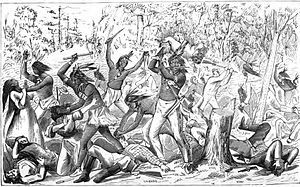| Indian Creek Massacre | |||||
|---|---|---|---|---|---|
| Part of the Black Hawk War | |||||
 An 1878 depiction of the massacre | |||||
| |||||
| Belligerents | |||||
| Illinois settlers | Potawatomi raiding party and three Sauks | ||||
| Strength | |||||
| 23 civilians | 40–80 warriors | ||||
| Casualties and losses | |||||
| 15 killed, 2 captured | |||||
The Indian Creek Massacre occurred on May 21, 1832 with the attack by a party of Native Americans on a group of United States settlers in LaSalle County, Illinois following a dispute about a settler-constructed dam that prevented fish from reaching a nearby Potawatomi village. The incident coincided with the Black Hawk War, but it was not a direct action of the Sauk leader Black Hawk and conflict with the United States. The removal of the dam was asked, was rejected by the settlers and between 40 and 80 Potawatomis and three Sauks attacked and killed fifteen settlers, including women and children.[1][2] Two young women kidnapped by the Indians were ransomed and released unharmed about two weeks later.
The tension of the massacre and the war prompted settlers to seek protection at frontier forts under the control of the militia. Three men were arrested for the killings, but the charges were dropped when their alleged role in the massacre could not be verified by the witnesses. Today, the site of the massacre is marked by memorials in Shabbona County Park in LaSalle County, about 14 miles (23 km) north of Ottawa, Illinois.